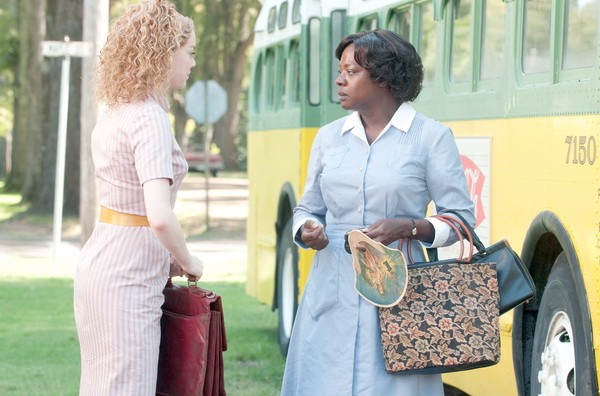The Help (2011) directed by Tate Taylor
This book has been near the top of the best sellers list for over a year now and I've always wanted to read it. Now that I've watched the movie, I don't know if that's going to happen anytime soon if at all. It's funny, I almost always watch the movie of a book I've read, but never the other way around. I think that's probably true for most people. There is an easy explanation for this; books take days if not weeks to read, movies take two hours. It's very difficult to get into a book, to invest a week into it, if you already know all the details. On the other hand, everybody wants to know how the book they read turns out on screen, if it's how they pictured it when they read it.
The Help captures a period in American culture where having black maids was common practice for white families especially in the south. These women were called the help, but they were much more than that; they kept houses together and in many cases raised other people's kids for them. It must be a strange feeling to bring up and care for your future employer who will most likely turn out to be a racist jerk like the rest of them. But perhaps that is why Aibileen (Viola Davis) takes such great interest and love in these white kids, that they may grow to be better people than their parents, that perhaps they will be the ones to enact change in this hostile environment. She recites a couple words of inspiration to her young ward throughout the film, "You is kind. You is smart. You is important." At least one white person was brought up right and that is Skeeter (Emma Stone), a young woman who has taken the lessons her family maid taught her to heart and whose care and affection she has never forgot. She sees the hypocrisy and blatant bigotry around her and decides to do something about it, to write a book from the perspective of the help.
Thematically The Help is somewhat similar to Driving Miss Daisy, a film I decided that I hated due to its obvious pandering and racial stereotyping. The Help is also very obvious and purposely manipulative; it seems almost impossible to make a film like this without being so. Yet I enjoyed this film much more than the 1989 Best Picture because it did not involve the one dimensional selfless servant that Morgan Freeman played. Instead, The Help features characters who have some more wrinkles to them; they are tired, guarded, and brave enough to stand up to the whites. Yes, they are spruced up a bit; the scenes with Aibileen and the young child are obnoxiously sentimental, but what can you really expect?
The film centers around Skeeter's attempts to get Aibileen, Minny (Octavia L. Spencer), and whoever else wants to volunteer to tell their stories of what it is like to work for white families. This takes substantial courage as it is against the law in this part of the South (Jackson, Mississippi) to promote this type of talk. This is an era where Hilly Holbrook, the woman who Minny works for, is attempting to pass a law that requires every house to have a separate bathroom outside for their Negro help. It is hard to imagine a character as viscous as Hilly existing; she is painted to be an obvious villain in a story, but sadly, people like her really did, do, exist.
The strength of the film is in its performances. This is the first non-comedic role I've seen Emma Stone in and she shows a young eagerness and perhaps a little nativity in her portrayal of Skeeter, qualities necessary to take on the establishment. Viola Davis, who earned an Academy Award nomination for a powerful eight minute role in Doubt, displays a quiet strength throughout the film though as I previously mentioned, she is given some extremely obvious scenes that I could have lived without. Octavia Spencer is a pleasure to watch. She is given a lot of funny moments (including a gag with a pie that brought the house down) and plays Minny with sass and energy, but yes, her role is somewhat of a stereotype of the big black Mammy image. (Is it a coincidence that her name is Minny?) Those are the three principle characters though I also enjoyed the character of Ceila (Jessica Chastain), an outsider to Jackson who struggles to gain acceptance in the community. She can relate to the blacks and her greatest moments come in bonding with Minny.
The Help is an obviously manipulative inspirational tearjerker, but I don't really mind being manipulated as long as I don't feel too dumb afterwords. It is a pretty obvious movie, though it points to a nice and cozy place in your heart and maybe that isn't such a bad thing.
Grade: B

No comments:
Post a Comment